#fan studies
Text
Help a Researcher
Leigh Ingram, a student at the University of Ottawa, in Canada, is completing a Master of Information Studies. The proposed research for their thesis is on information seeking behaviours in the fanfiction community, with a specific focus on how AO3 users search through the archive and use the embedded search functions on the website.
This study has received ethics approval for an anonymous online survey, followed by a few interviews. The survey will remain open for approximately 6-8 weeks depending on the volume of response. Following completion of the research, the intention is to share the anonymous data collected and potentially submit an article to Transformative Works and Cultures for consideration, so any findings will be shared with OTW/AO3.
Survey takers must be 18 or older to take part. If you would like to learn more about the study you can review its consent form, which contains the researcher's contact information.
699 notes
·
View notes
Text
Moral purity and imaginative resistance as influencing factors in fandom 'anti' attitudes
Jessica Black et al.'s 2019 experiment on the correlation between enjoying dark/villainous characters, personal morality and purity beliefs, and imaginative resistance is so interesting when applying it to anti culture and fandom.
They created a Dark Character Scale where participants self-selected how strongly in agreement or disagreement they were with a series of statements about dark or villainous fictional characters. Some of these questions were the following:
"I enjoy films and books that feature main characters that choose morally questionable actions."
"I can often understand where the bad guys in fiction are coming from."
"My favourite fictional characters are morally ambiguous and often do horrible things."
They then utilised the Moral Foundations Questionnaire (Graham et al. 2011) to see what participants considered important when deciding on whether something is morally right or wrong, for example:
Whether or not someone suffers emotionally
Whether or not someone did something disgusting*
Whether or not someone was cruel
Whether or not someone was denied [their] rights
Whether or not someone acted in a way God would approve of*
as well as how strongly participants agreed or disagreed with statements such as:
Compassion for those who are suffering is the most crucial virtue
People should not do things that are disgusting, even if no one is harmed*
It can never be right to kill a human being
I would call some acts wrong on the grounds that they are unnatural*
Respect for authority is something all children need to learn.
One of the final scales participants used was the Black & Barnes (2017) Imaginative Resistance Scale. This is basically used to gauge how resistant the reader is to enjoying or consuming fictional content that contains characters, situations, or worldbuilding that they personally find morally disagreeable. They had to select how strongly they agreed/disagreed with questions like:
Reading books where bad things are depicted as morally acceptable makes me feel dirty
I just can't go along with a story when it violates my beliefs about morality
At times it feels like the author of a book is asking me to endorse actions that I know are wrong
Some things just shouldn't be done, even within a book
I sometimes cannot go along with a story when the "good" characters do morally reprehensible things
Sympathising with immoral characters makes me feel immoral myself.
Unsurprisingly, analysis of the data revealed that there was a strong correlation between disliking or not enjoying dark fictional characters or villains and having a higher purity morality score and more imaginative resistance.
They performed this test in three studies done on three completely different demographics - the first being mostly liberal women from social media sites, the second being mostly younger conservative college undergrads, and the third being adults split 50/50 in gender recruited from MTurk. All three studies showed that having stronger imaginative resistance and higher purity morality scores is directly linked to a lower score on the DCS - meaning that they would like or enjoy dark fictional characters and their actions less.
This tracks pretty well with what can be seen in the emerging anti culture within fandom:
Self-identified 'antis' are likely to agree strongly with the statements from the Imaginative Resistance Scale, and are more likely to score highly on the questions in Moral Foundations Questionnaire that are specifically demarcated as being concerned with purity (marked above with an asterisk *). This means that they are also, according to these studies, much more likely to disagree with dark fictional characters and their actions.
There is also a very interesting point in one of the discussions areas where Black et al. state "It is worth reiterating that the participants in Study 2 tended to be more conservative, and therefore potentially more likely to have greater concerns about moral purity" which tracks with what people in fandom have been saying about antis parroting conservative/puritan talking points and arguments.
What I find the most interesting is the following statement:
"However, moral purity and imaginative resistance are consistently positively correlated, both in the current studies and in prior research ... and are both likely to reflect a fear of moral contagion that would discourage people from identifying with and liking [dark fictional characters]."
This, when applied to antis, suggests that antis may harbor the subconscious belief that enjoying dark fictional content, and therefore being a 'proshipper', is literally psychically contagious. They may view this as some kind of moral disease which is spreading and infecting fandom, which could explain why they are so vehemently against it - fear. This is the puritan Moral Panic all over again.
Black et al. also discuss theories of fictional engagement and parasocial relationships/identification, and whether these studies is relevant to "when and for whom fictional engagement could have the potential to negatively affect real world attitudes or behaviour".
Jessica Black and Jennifer Barnes often publish articles together and have some incredibly interesting reading of morality and fiction that I'd be interested to see applied to fandom and anti culture in an academic setting. Perhaps some people in the field like Samantha Aburime (@rainystudios) are already looking into it - and I'm hoping I can do the same in my studies.
277 notes
·
View notes
Text
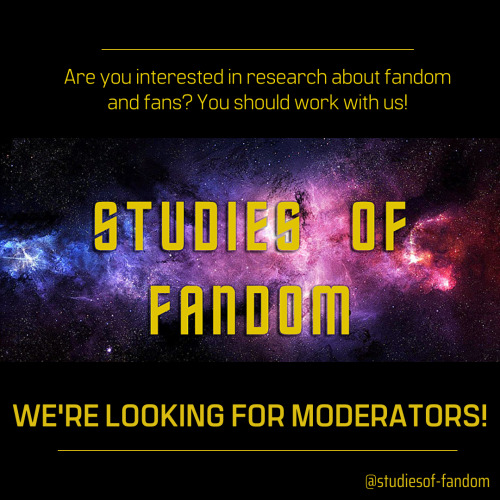
I can't keep this blog running by myself, so I’d love to have people to help me around!
What do you have to do as a moderator?
You have to search for new posts related to fandom and Fan Studies and read them to evaluate their content (we have a compilation of places to help to do this task);
You have to select posts and then tag them according to the topic the posts are about (we have a guide explaining how the tag system works);
Ideally you should know how to queue posts, but it’s not a requirement. If you’re willing to learn, that is more than enough.
You have the freedom to choose how your schedule as a moderator of @studiesof-fandom will work! We only need to have content posted a few days every week to keep this blog running and updated.
If you’re interested, please send an inbox to @studiesof-fandom!
I ask for my followers to reblog this post to spread the word!
146 notes
·
View notes
Video
I recently made a couple of videos about an interesting group project in my Online Fandom class a few years ago, so I thought I would share here, too!
TL;DR A group of students who knew nothing about fanfiction before this class really wanted to study sports fandom, so they did a study about sports RPF. Their research question was: What factors contribute to which athletes are most commonly written about? In case you don’t want to watch the video, answer below the cut...
(1) They compared metadata from AO3 to sports stats - winning teams, individual performance, etc. - as well as net worth of players. What they found was... none of those things seemed to matter. (But one of the other students in the class said, “Well did you measure hotness?”)
(2) In the second half of the class I distributed a survey here (some of you might have taken it, this was in 2018!) based on questions that the student groups composed. They had a multiple choice question about which factors people cared about when writing and reading sports RPF and the two most popular answers were “physical attractiveness” and “personality.” But they also analyzed open answers, and the two other common themes were friendships or rivalries with other players, and the writer/reader feeling a personal connection to that player.
This ended up being one of my favorite projects in the class because it sparked a really interesting discussions about methods and measurement and knowing the right questions to ask and how to ask them!
Also! I mentioned a scrape of AO3 data in the video. FYI this was only metadata, and it was also de-identified - basically just numerical data (date posted, word counts, hits, number of comments, etc.) and tags like fandom and characters. No story names, authors, etc. If you’re interested in thinking through research ethics for using fandom data, I co-authored a paper about that!
(Also I just realized that despite filming these videos two weeks apart I am wearing the same shirt, haha!)
1K notes
·
View notes
Text
Research Study: Fandom & Generative AI still looking for participants!
I'm still recruiting research participants for my PhD dissertation study!!! If you've already participated, thanks so much! If you haven't participated yet, please consider responding to a quick survey, and sharing with your friends!
I'm interested in understanding fans' perspectives on and experiences with generative AI (text and image generation software). That means perceptions both positive and negative! However you feel about genAI, I'm interested in hearing from you. We're especially seeking diverse perspectives from underrepresented demographic groups of people.
If you're over 18, can speak/understand English, and are interested in participating you can learn more information and take the survey here. I've also made a FAQ post about the study that I've pinned to the top of the blog, and you can see more info on the shareable flyer below. You can also view posts on Twitter/X, Bluesky, and Reddit about the study and share info there! Spreading the word is greatly appreciated :)

The study is anonymous and voluntary, and you'll be asked about your fandom background, attitudes towards generative AI, and demographic information. The survey should take about 15-20 minutes, and you can skip over any questions you want. You can also elect to participate in a follow up interview, if you want to. The full details are on the consent form, which you'll be able to read before taking the survey! Feel free to reach out with any questions.
#fanfic#fandom#fanart#ai#art#writing#fan culture#fandom meta#fandom culture#fandom things#research#research study#fan fiction#fan art#fanfiction#ao3 fanfic#fic writing#artificial intelligence#technology#creative writing#creation#creativity#fandom polls#fandom research#fan studies#academic research#research survey#artists on tumblr#writers on tumblr#anime and manga
108 notes
·
View notes
Text
R.I.P lord byron, if you were alive today your DMs would've been fucking insane
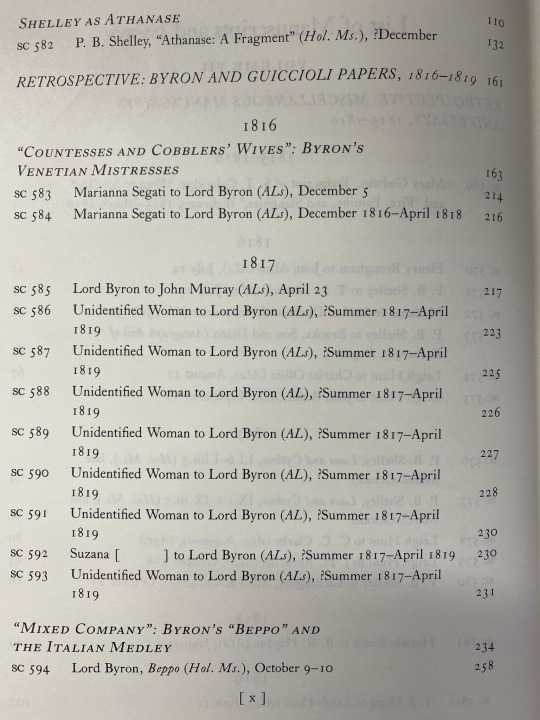





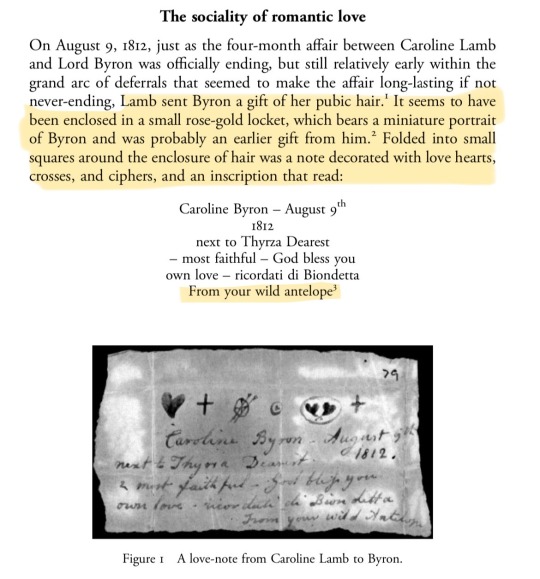
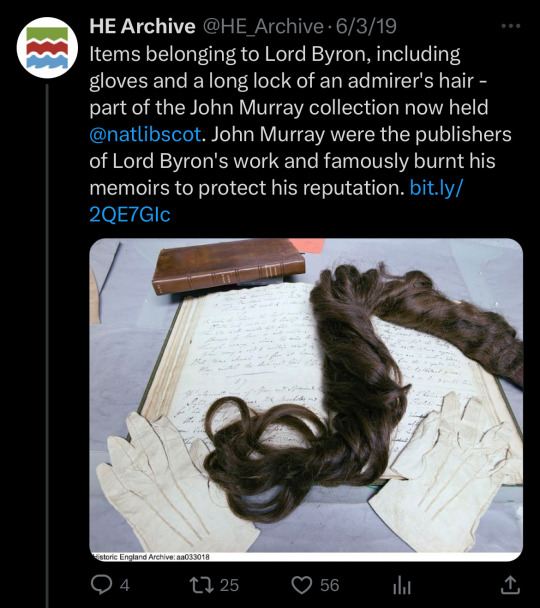
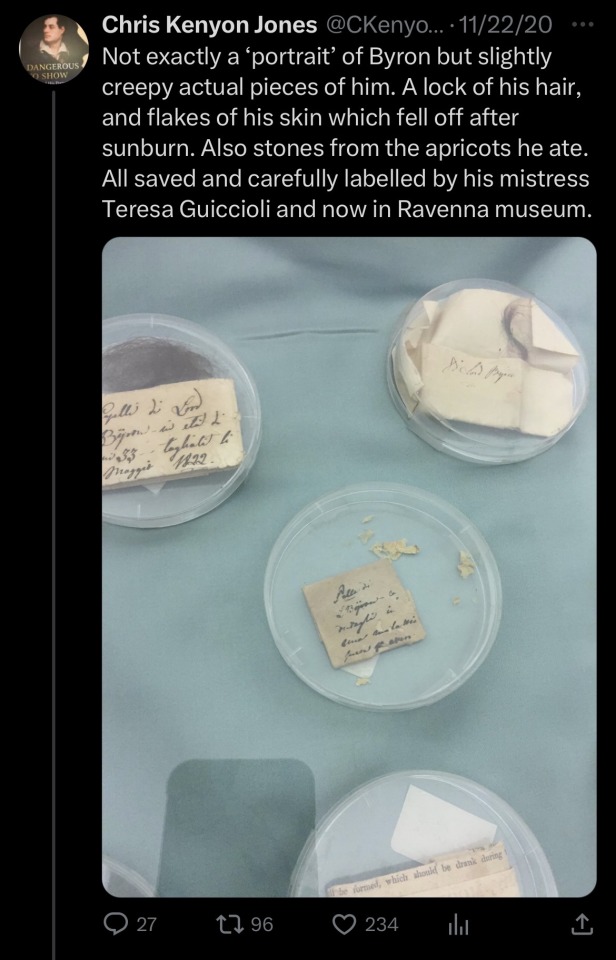

Sources/Notes: Shelley & his Circle vol. 7 (my photos), Flirting with fame: Byron's anonymous female fans by Corin Throsby, Fangirl(s): Lord Byron edition by Cailey Hall, Lord Byron and Scandalous Celebrity by Clara Tuite, long lock of hair is probably the one mentioned in Byron's Romantic Adventures in Spain by Richard Cardwell, Clairmont Correspondence by Marion Stocking.
#lord byron#literature#fan letters#dms#its a good thing he didn't live to see social media#byron#english literature#romanticism#poetry#aesthetic#dark academia#funny#letters#fan studies#byronic hero#romance#romantic poets#the romantic era#romantic poetry
245 notes
·
View notes
Text
Five Things Mel Stanfill Said
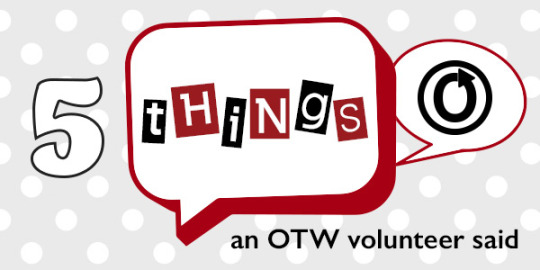
In Five Things, Mel Stanfill discusses helping broader academia and fans recognize fandom as an area of study via our academic journal TWC. Read more at https://otw.news/rul
196 notes
·
View notes
Text
Hat jemand von Euch Lust sich wissenschaftlich mit Fanfiction & deren aneignenden Potential zu beschäftigen, u.a. konkret mit Schoethe?
An diesem Workshop der Goethe-Uni Frankfurt zur akademischen Arbeit mit Fanfiction könnt ihr auch über Zoom teilnehmen! Ich gebe den Zugangslink bei Interesse weiter und würde mich freuen <3
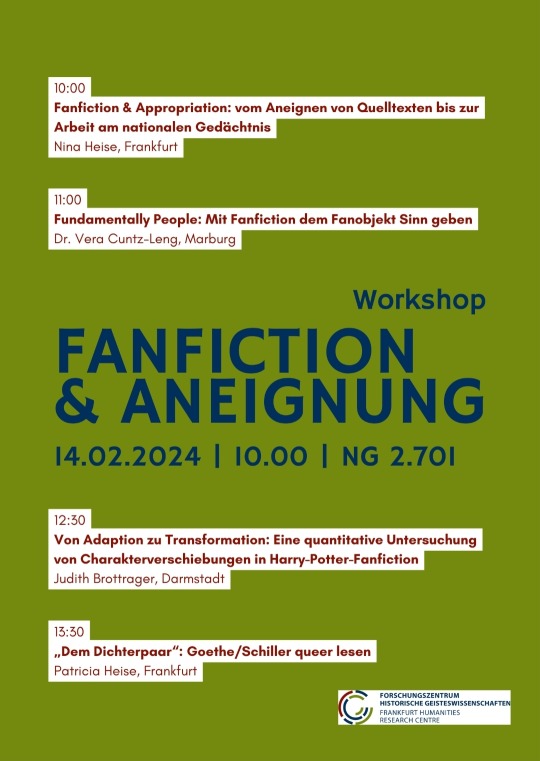
132 notes
·
View notes
Text
Today, we're *thrilled* to publish our first article in quite some time: Maria Temming digs deep into the world of whump. On hurt/comfort and fictional characters in pain, featuring quotes from a wide variety of whumpers on what the subgenre—and the community around it—means to them.
533 notes
·
View notes
Text
Quick question
I did some more academic reading about fandom and ...
Bonus points if you comment (or tag) where you heard the word "hoyay" and in which contexts you're using it.
#fandom#fan studies#ao3#fandom meta#fanfiction#fanfiction writer#fan#queerbaiting#queer rep#queer rep in media#media science research#merlin bbc#bbc sherlock#supernatural#spn#destiel#johnlock#merthur#y'all know what i'm talking about#quick question#fanfic readers#fanfic#media science#academic writing about fanfics is something else#i love it#hoyay#ho yay
182 notes
·
View notes
Text


These excerpts are from Damien Hagen’s “Regeneration and trans possibility in Doctor Who,” which was published in the most recent issue of Transformative Works and Cultures, OTW’s open access journal. It’s free to read… here (click the button that says HTML)!
Here’s what the editors of the issue had to say:
“Damien Hagen focuses on Doctor Who fandom and the way in which the Doctor's regenerative capacity provides the means for queer and trans fans to explore trans possibilities and gender euphoria. Long before the Doctor's ability to change genders became canon in Doctor Who in 2018 with Jodie Whittaker's Doctor, trans fans have been drawn to the series for its emphasis on changeability, malleability, and bodily fluidity. Through an autoethnographic lens, Hagen argues that Doctor Who can be read as a trans media object—one that is not necessarily explicitly transgender but instead opens up gendered possibilities in which trans fans can imagine otherwise. Hagen further draws on other trans fans' queer and trans readings of a variety of canonical moments in Doctor Who to argue that the ephemerality and liminality of the series can be particularly pleasurable and gender affirming for trans and nonbinary fans who are undertaking their own processes of regeneration. While the series might never have been intended as a trans narrative, Hagen argues that through fannish interpretations and queer readings, it has the potential to provide a mechanism for survival, self-love, and gender euphoria.”
In the plainest terms, Hagen discusses his own/other trans fans’ experiences with Doctor Who as a tool to understand and love their transness. Themes of the show that trans people may relate to include:
Emphasis on change as a good thing (and lifesaving).
Carrying previous selves into the future, loving previous bodies and selves.
The specific experience of ‘creating’ a new body (the Doctor’s ability to regenerate), acceptance of/excitement about those bodies from oneself/others.
Doctor Who, Hagen argues, is a “trans media object,” or a piece of media that may not have explicitly trans characters but allows viewers to see transness reflected in other ways. For instance, when the Doctor and other characters accept their new body, it can feel affirming to a trans viewer who is also navigating the experience of a changing body. Hagen writes, “The regenerations weren't about gender, but my nascent transness felt them as such.”
Do you have a similar experience with Doctor Who? Or are there other media you have felt similarly about?
-Lianne
#fanhackers#fan studies#gender#fandom studies#doctor who#transformative works#transgender#trans studies#author: lianne
557 notes
·
View notes
Text
Let's Learn About Mental Illness and Fandom!
ETA: This survey has now closed. Thank you for so many more responses than I expected! I will announce as soon as the data is available to others to use and as I make my own discoveries in working with it.
Thank you so much everyone for your responses to my fanfiction and mental illness survey. As of posting we have 108 responses which is fantastic and very much enough for my own thesis, but I don't just want this data to be for me - I want it to be available to other fan studies researchers to work with and build upon.
This is the work I spoke about when I was on the @fansplaining podcast just a few months ago, and something that we just don't have in the fan stats community - our only related information is on whump, which whilst useful isn't by any means the same thing.
So if you'd like to help us learn more about how we read, write and interact with fanfiction about mental illness, please take the survey & share this post!
The survey will take you just 5-15 minutes, and will help to gather groundbreaking insights for fan studies. You’ll be asked about yourself, about how you read, write and find fanfiction about mental illness, and what interacting with this kind of fanfic has been like for you.
Full data on the study, including consent, privacy and GDPR information, can be found on the survey page.
Submissions will remain open until the 25th June 2023. Thank you so much!
#fan studies#fandom studies#fanfic#fandom research#fanfiction#fandom#fandom stats#phdresearch#mental illness#mad studies#fanstats#fandom meta#fandom culture#fandom history#a03#mental health#fanfics
211 notes
·
View notes
Text
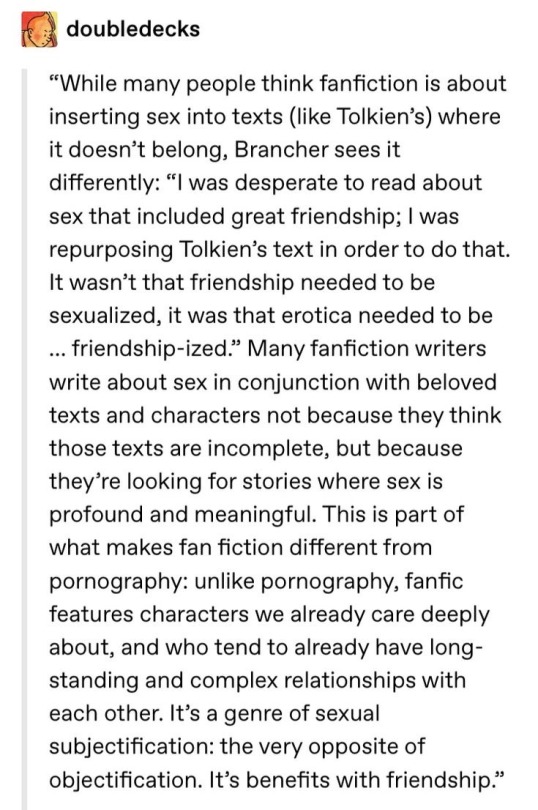
[ID: Screenshot of a tumblr post from @doubledecks with a quote from an unknown source, which reads:
"While many people think fanfiction is about inserting sex into texts (like Tolkien's) where it doesn't belong, Brancher sees it differently: "I was desperate to read about sex that included great friendship; I was repurposing Tolkien's text in order to do that. It wasn't that friendship needed to be sexualized, it was that erotica needed to be ... friendship-ized." Many fanfiction writers write about sex in conjunction with beloved texts and characters not because they think those texts are incomplete, but because they're looking for stories where sex is profound and meaningful. This is part of what makes fan fiction different from pornography: unlike pornography, fanfic features characters we already care deeply about, and who tend to already have longstanding and complex relationships with each other. It's a genre of sexual subjectification: the very opposite of objectification. It's benefits with friendship." End ID]
does anybody know where this quote is from? i found it in my camera roll and i think its an absolutely brilliant way of looking at queer readings of sam/frodo as well as slash fiction in general. i think its from an essay or article or something and i want to read the whole thing. if anyone knows where its from pls lmk!
edit: it’s been found! it’s from “The Fanfiction Reader: Folk Tales for the Digital Age” by Francesca Coppa!
#lord of the rings#samfro#sam/frodo#samwise gamgee#frodo baggins#slash fanfiction#queer reading#the lord of the rings#ao3#fanfiction#fanfic#fan studies#.txt#alex talks
67 notes
·
View notes
Text
Sometimes reading fanfic is such a time capsule. I'm reading one right now giving off very strong teen vibes, in part based on prose but also by how concerned the characters are with rumors and its impact. Knowing what a teen considers to be a good rumors versus a bad rumor is so interesting, a frozen record of high school and the moral concerns of when this was written.
And it is an older fic, because the mall is where everyone hangs out after school and that's just not really done anymore. So it's a time capsule in that way too; how it was center stage for showing off fashion or relationships, how consumerism was used to kill bordem.
I know people look at things like diaries and news sources to understand what things were like back in the day, but sometimes i feel like you can use fanfic like that too. A lot of it is so immediate.
46 notes
·
View notes
Text
It deeply saddens me that the writers on Community do not know that fan studies (the academic study of fandom) is a field, not only because Community itself has been the subject of several great analyses (along with Inspector Spacetime), but because it is so clearly Abed’s calling. The entire field is a beautiful mash up of sociology, film, and media studies. Abed’s happy ending would absolutely involve him (and obviously Troy) finding this academic space and being taken so seriously by all these nerds. They’d get to talk about conventions and movies and filmmaking and the dreamatorium and tropes and be extremely successful video essayists/ podcast hosts. I could so see their ending being Troy hyping up Abed to give his first conference talk and all the professors going wild over him and asking dozens of follow up questions and having deep conversations.
Also they’d be the undefeated champs at the night pop culture time trivia games.
#community#community tv#troy barnes#abed nadir#inspector spacetime#fan studies#I just need an ending where they’re boyfriends at the academic conference
40 notes
·
View notes
Text
Supernatural (2005) through the lens of narratology, recent roundup
Wikipedia: Narratology is the study of narrative and narrative structure and the ways that these affect human perception. [...] Cognitive narratology is a more recent development that allows for a broader understanding of narrative. Rather than focus on the structure of the story, cognitive narratology asks "how humans make sense of stories" and "how humans use stories as sense-making instruments".
Supernatural is a very attractive media franchise for narratologists. There are quite a few papers that include narratological analysis of Supernatural and related phenomena, such as narrative perception in fandom. Here are some from the past decade. I'll continuously update this if I find more.
Favard, F. (2018). Angels, demons and whatever comes next: the storyworld dynamics of Supenatural. Series - International Journal of TV Serial Narratives, 4(2), 19–26. https://doi.org/10.6092/issn.2421-454X/8164 (full text, pdf button hidden towards the bottom of the page)
Herbig, Art; and Herrmann, Andrew F.. 2016. Polymediated Narrative: The Case of the Supernatural Episode "Fan Fiction". International Journal of Communication. Vol.10 1-18. http://ijoc.org/index.php/ijoc/article/view/4397 ISSN: 1932-8036 (full text, pdf)
García, A. (2016). A Storytelling Machine: The Complexity and Revolution of Narrative Television. Between, 6(11). https://doi.org/10.13125/2039-6597/2081 (full text, pdf button hidden towards the bottom of the page)
Wilcox, R. V., Abbott, S., & Howard, D. L. (2018). A tribute to David Lavery: Television canon, television creativity. Critical Studies in Television, 13(4), 455–469. https://doi.org/10.1177/1749602018799246 (restricted, webpage)
Theological narrative
Nosachev, Pavel. 2020. "Theology of Supernatural" Religions 11, no. 12: 650. https://doi.org/10.3390/rel11120650 (full text, webpage)
Fandom narrative
Boni, Marta, and Valentina Re. “The Monster at the End of This Book.” Essay. In World Building: Transmedia, Fans, Industries, 321–42. Amsterdam, North Holland: Amsterdam University Press, 2017. (full text, pdf)
Rouse, Lauren. 2021. "Fan Fiction Comments and Their Relationship to Classroom Learning." In "Fan Studies Pedagogies," edited by Paul J. Booth and Regina Yung Lee, special issue, Transformative Works and Cultures, no. 35. https://doi.org/10.3983/twc.2021.1911. (full text, webpage) @transformativeworksandcultures
73 notes
·
View notes